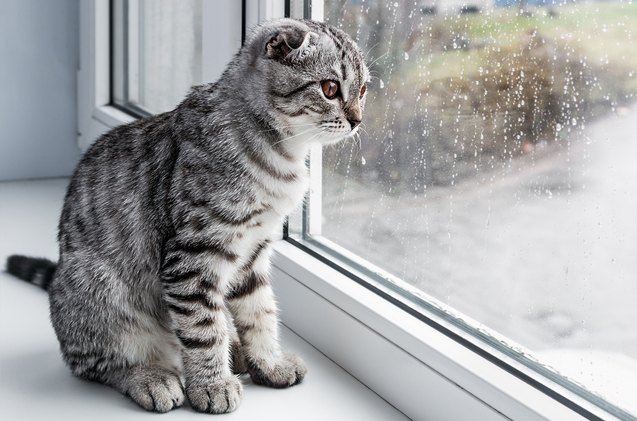What To Do If Your Cat Has Separation Anxiety

Just like dogs, some cats will experience separation anxiety when they’re left home alone. If you leave a camera running while you aren’t home, you may be able to see if your kitty is restless and anxious when you aren’t around. But you can also determine if your pet has separation anxiety based upon how she behaves as you get ready to head out the door.
If you notice that your pet is suffering from separation anxiety, there are steps you can take to put her at ease, some of which are listed below.
Related: Feline Yogi’s Yoga Mat Toy
Enrich Your Cat’s Environment
Providing your cat with an environment that prevents boredom is one way to combat separation anxiety. You can enhance your cat’s surroundings with elevated areas, puzzle feeders, hideaways, and cat trees, as a few examples.
The key is to make your home an exciting and stimulating, yet safe and secure, place to be. Give your kitty a spot near the window so she can look outside, leave some cat-friendly TV shows on, or play classical or soft music in the background, as a few other options.
Every cat is different, so try to figure out what your cat prefers doing to stay entertained and release some energy while you aren’t home. Then, when you get home, you can interact with your cat by playing, petting, and snuggling with her.
Related: Do Pet Pheromone Plugs-Ins Really Work?
Don’t Announce Your Departure
If you make a big deal before you leave the house, your cat will know what’s going on, and the anticipation of you being gone could trigger her anxiety. Try not to overdo it when saying goodbye to your kitty. Instead, keep things casual and relaxed.
You can also try ignoring your cat for about 15 minutes before you leave and also after you get home. Provide a happy distraction, such as one of her favorite toys, or hide treats around the house for her to hunt down. You can even take out certain toys before you leave and put them away when you get back.
Practice Your Routine
Another option is to practice leaving and returning home. This is especially helpful if your kitty gets anxious whenever she hears the keys or sees you getting your coat or purse. By practicing a few times a day without leaving, you may be able to ease your cat’s fears.
Start by picking up your keys, for example, and putting them back down multiple times throughout the day. Next, walk to the door and back without leaving. Then take things a step further by picking them up and walking to the door and back a few times. Then practice putting your coat on and taking it off before combining all the steps together. Finally, actually walk out of the door but come right back. Practice greeting your kitty in a casual manner.
These little practice sessions can be done at varying times throughout the day and/or evening. The key is to gradually increase the amount of time that you’re outside the door. Also, pay attention to particular triggers, such as the sound of your keys. In that case, try carrying the object around the house for a little while every day in an effort to eliminate your cat’s anxiety towards it.
Get Your Cat a Buddy
Having a companion can make your kitty feel less alone and anxious when you aren’t around. They’ll be able to sleep and play together, as well as groom each other, eat together, and communicate in their own way.
If your cat is already older, a young kitten may be too energetic for her, though, so consider what the best type of companion would be for your cat, and then consider adopting one if you can add another feline member to your family. And introduce the new kitty gradually for the best results.
Discuss the Problem with a Vet or Feline Behaviorist
Having a discussion with a veterinarian about your cat’s stress and anxiety is a great idea because you can pinpoint ways of helping your particular pet if the above tips aren’t enough.
It’s also important to determine if the anxiety is the result of separation or another underlying condition that needs to be treated. Either way, your vet may be able to prescribe medications or natural remedies to calm your cat.
In addition to speaking with a vet, you can also speak with a feline behaviorist who really understands cats and can help you figure out how to make your pet feel comfortable while you’re away from home.

Lisa Selvaggio is a freelance writer and editor, and our resident cats-pert, with certifications in pet nutrition and pet first aid. She enjoys producing content that helps people understand animals better so they can give their pets a safe and happy home.
More by Lisa Selvaggio























